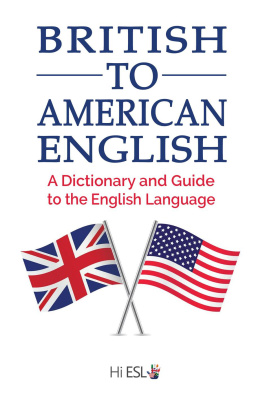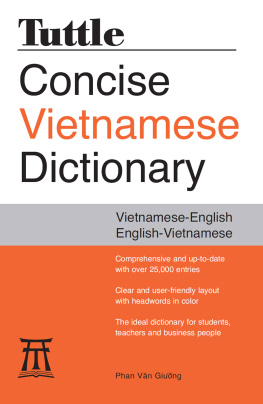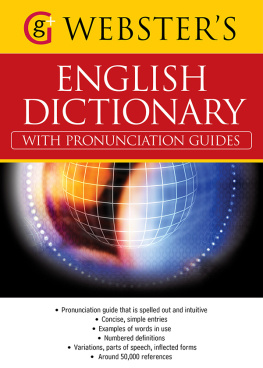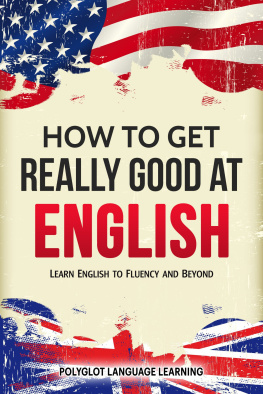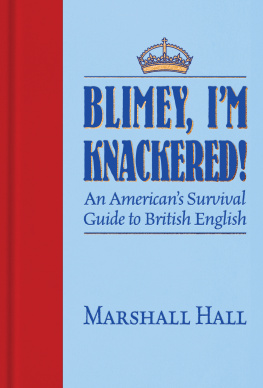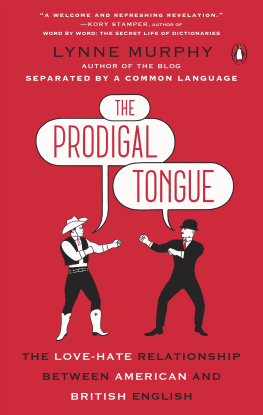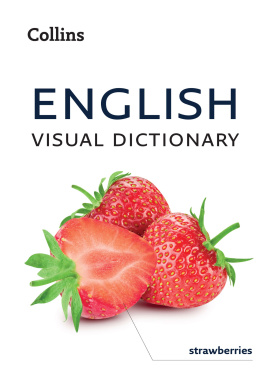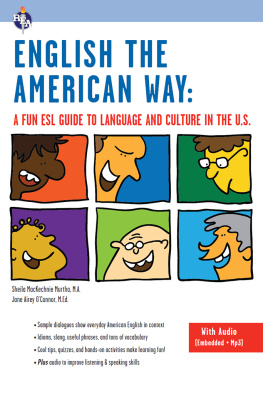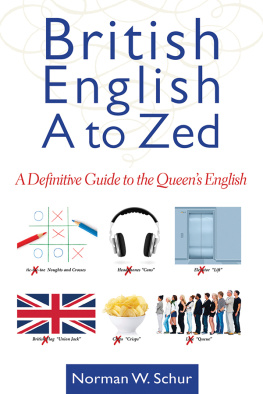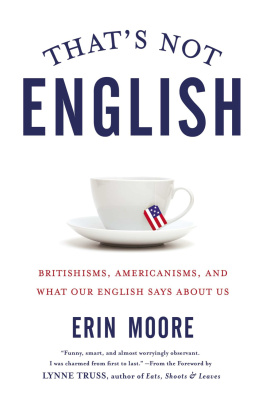Louis McKinney - British to American English: A Dictionary and Guide to the English Language
Here you can read online Louis McKinney - British to American English: A Dictionary and Guide to the English Language full text of the book (entire story) in english for free. Download pdf and epub, get meaning, cover and reviews about this ebook. year: 2019, publisher: Hi ESL, genre: History. Description of the work, (preface) as well as reviews are available. Best literature library LitArk.com created for fans of good reading and offers a wide selection of genres:
Romance novel
Science fiction
Adventure
Detective
Science
History
Home and family
Prose
Art
Politics
Computer
Non-fiction
Religion
Business
Children
Humor
Choose a favorite category and find really read worthwhile books. Enjoy immersion in the world of imagination, feel the emotions of the characters or learn something new for yourself, make an fascinating discovery.
- Book:British to American English: A Dictionary and Guide to the English Language
- Author:
- Publisher:Hi ESL
- Genre:
- Year:2019
- Rating:5 / 5
- Favourites:Add to favourites
- Your mark:
British to American English: A Dictionary and Guide to the English Language: summary, description and annotation
We offer to read an annotation, description, summary or preface (depends on what the author of the book "British to American English: A Dictionary and Guide to the English Language" wrote himself). If you haven't found the necessary information about the book — write in the comments, we will try to find it.
British to American English: A Dictionary and Guide to the English Languageperfect for every academician, whiz-kid or bookworm looking to conquer the language barrier.
The Americans are identical to the British in all respects except, of course, language. ~ Oscar Wilde
Whether youre travelling to Great Britain or the United States of America, or you just want to understand the differences in our common language divided, this unique dictionary will answer all of your questions. The book contains a wide array of British terms and expressions and their American equivalents; coupled with a history of the language, numerous examples of its everyday usage such as making small talk, and customs and etiquette.
BRITISH vs. AMERICAN ENGLISH. A LIFESAVER?
The guide provides copious amounts of valuable material by covering the differences between the British and American English accents, pronunciation, grammar, spelling, as well as an A-Z on idioms, a glossary of common differences and variations in slang, and metaphors.
The English language is a West Germanic language that was first spoken in early medieval England, and is now the global lingua franca. Travel back in time to find out how the earliest spoken dialects of English were brought to Great Britain by Anglo-Saxon settlers back in the 5th century. Explore how English is closely related to the Frisian languages, and learn how its vocabulary has been significantly altered by other Germanic languages, including Latin and in particular French, after the Norman conquest of England in the 11th century.
Part language guide, part cultural study. Its a superb addition to every English language learner and linguists library.
Filled with extensive quotations from authentic, real-life English from both sides of the pond (the Atlantic Ocean), this is an easy-to-follow, precise and organised guide which tackles the differences, and the similarities between the grammar of British and American speakers. The book is especially effective and useful for learners with no prior knowledge of linguistics, as it demonstrates the grammatical differences and provides a sound account of contemporary English in use.
William compares the customs, manners, and practical scenarios of everyday life in the United Kingdom and the United States. Furthermore, he wraps up with a humorous list of expressions that in one country are innocent, but that can be quite vulgar or suggestive in the other.
Two large glossaries help travellers translate from British to American English with meanings such as:
Any visitor to Old Blighty or Uncle Sam can be brought right up to speed with the this handy A to Z on the most commonly used and the not so commonly used English words that can often cause confusion, bedlam, red faces and even cost you money if misused or misunderstood.
Louis McKinney: author's other books
Who wrote British to American English: A Dictionary and Guide to the English Language? Find out the surname, the name of the author of the book and a list of all author's works by series.

